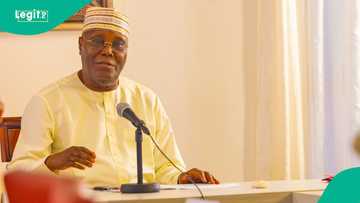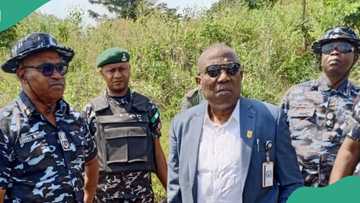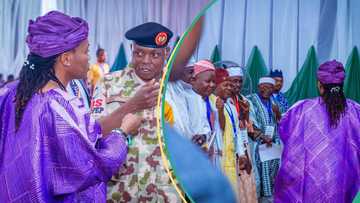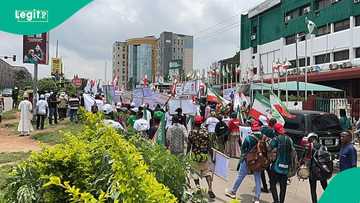Kings and their titles in Nigeria: List of traditional rulers
Some people may ask if there are communities that still adhere to the old culture and way of life, because much has changed over the years. In Nigeria, a traditional ruler is in charge of one or more African traditional states. Many Nigerian communities still observe and respect traditions. Find out the various kings and their titles in Nigeria.
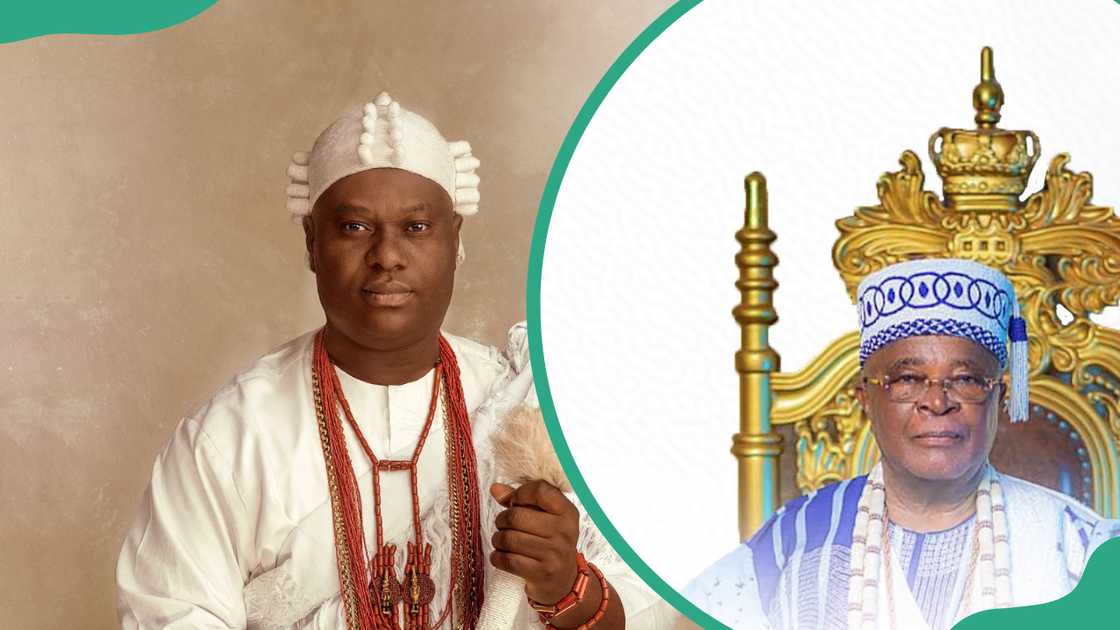
Source: UGC
TABLE OF CONTENTS
- Key takeaways
- Kings and their titles in Nigeria
- What are the Nigerian names for kings?
- Who is the most powerful king in Nigeria?
- Who was the first king in Yoruba land?
- How many kings are there in Nigeria?
- Who is the most powerful king in Yorubaland?
- What are the three titles given to traditional rulers in Nigeria?
Key takeaways
- Different ethnic groups in pre-colonial Nigeria created traditional administrative structures representative of their local cultures, beliefs, and customs.
- As a result, the governments founded by the Igbo, Yoruba (Oyo Kingdom), and Hausa-Fulani were unique and had diverse ways of operating.
- While some kings and their titles in Nigeria have less influence than before, they are still revered in various communities.
Kings and their titles in Nigeria
There are more than 100 traditional chiefs in Nigeria. The following is a list of top traditional rulers in Nigeria and their names in 2025, including the state(s) or region(s) they control, and their titles.
Name | Title | Region/state of rule |
Adeyeye Enitan Ogunwusi | Ooni | Ife |
Sa'adu Abubakar | Sultan | Sokoto |
Idia | Queen Mother | Benin |
Shango | Alaafin | Oyo |
Ogiame Atuwatse III | Olu | Warri |
Efunroye Tinubu | Princess Consort to Oba Adele Ajosun | Lagos and Paramount |
Sir Adeniji Adele K.B.E. | Oba | Lagos |
Alfred Achebe | Obi | Onitsha |
Jaja | Amanyanaboh | Opobo |
Abubakar Ibn Umar Garbai El-Kanemi | Shehu | Borno |
People who hold traditional titles are those who inherited them from earlier heads of sovereign states or groups. Even though they do not hold official political power, they strongly influence the residents of their town and are highly respected.
The Yoruba chieftaincy system, in particular, has four distinct ranks: royal chiefs, noble chiefs, religious chiefs, and common chiefs. The obas, who are at the top of the hierarchy and act as the system's fons honorum, are in charge of the royals. Explore some of the renowned rulers below.
1. Oba Adeyeye Enitan Ogunwusi
- Date of birth: 17 October 1974
- Region/state: Ife
- Reign: 26 October 2015 – present
Oba Adeyeye Enitan Ogunwusi's name cannot be left out of the list of kings and their titles in Nigeria. He is the 51st Ooni of Ife. He is the Yoruba kingdom of Ile-traditional Ife's monarch.
He is a well-known humanitarian who supports the underprivileged and is dedicated to mankind. Over the years, he has assisted the House of Oduduwa Foundation and, more recently, the Hopes Alive Initiative.
2. Adedotun Aremu Gbadebo III
- Date of birth: 14 September 1943
- Region/state: Egba
- Reign: 2 August 2005 – present
The list of traditional titles in Nigeria cannot be complete without the current Alake of the Egba clan in Abeokuta, Nigeria. Adedotun Aremu Gbadebo III was a naturalised member of the Laarun Ruling House.
He is the nephew of Oba Gbadebo II and the grandson of Oba Gbadebo, the sixth Alake of Egbaland, who ruled from 1898 to 1920.
3. Oba Sikiru Kayode Adetona
- Date of birth: 10 May 1934
- Date of death: 13 July 2025
- Region/state: Ijebuland
- Reign: 2 April 1960 – 13 July 2025
Oba Sikiru Kayde Adetna was one of the top kings in Nigeria in 2025 before his death. He was the Awujal of the Ijbu Kingdom, a traditional state in Nigeria. Oba Sikiru was one of Nigeria's rulers with the longest reign. He belonged to the Anikinaiya House. His successor is yet to be announced.
4. Oba Aladetoyinbo Ogunlade Aladelusi
- Date of birth: 28 December 1956
- Region/state: Akure Kingdom
- Reign: 17 July 2015 – present
Oba Aladetoyinbo Ogunlade Aladelusi, also known as Odundun II, is among the first-class kings in Nigeria. He is the 47th and current ruler of the Akure Kingdom, a traditional state in Akure, the Ondo State capital.
He represented the Nigerian Institute of Architects and was a founder member of the Nigerian Architects Registration Council (ARCON).
Regarding the importance of youth in governance, he has delivered public lectures at prestigious universities, including Obafemi Awolowo University and Adekunle Ajasin University.
5. Oba Adesimbo Victor Kiladejo
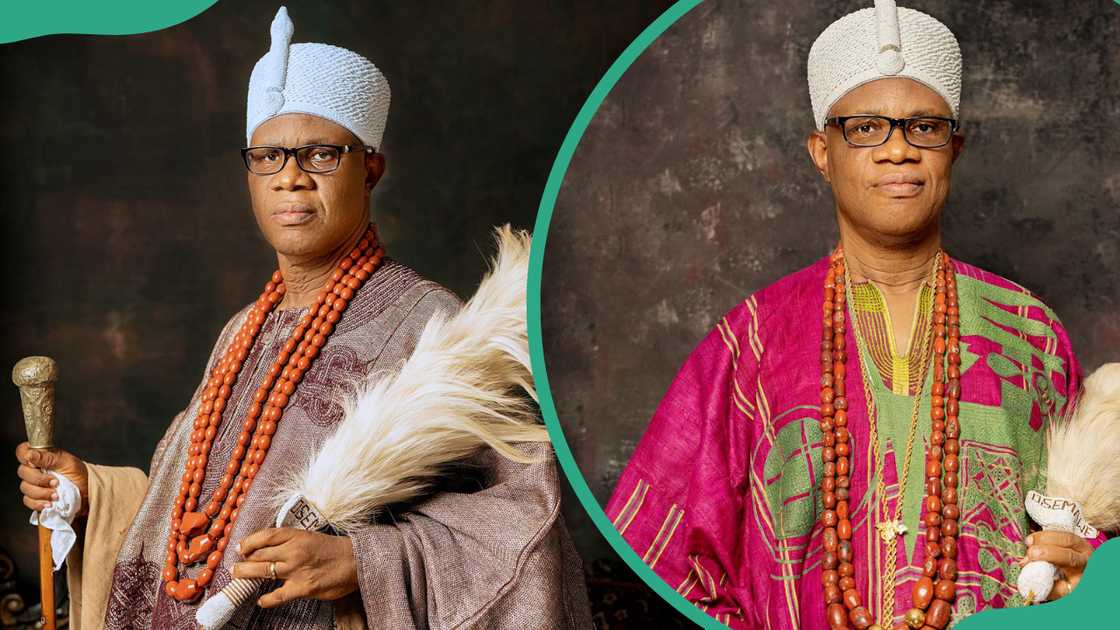
Source: UGC
- Date of birth: 1970
- Region/state: Ondo Kingdom
- Reign: 29 December 2008 – present
Adesimbo Oba Jilo III, also known as Victor Kiladejo Adenrele Ademefun Kiladejo, is one of the top traditional rulers in Nigeria. He was chosen to serve as the 44th Osemawe, or traditional head of state, of the Ondo Kingdom in Nigeria.
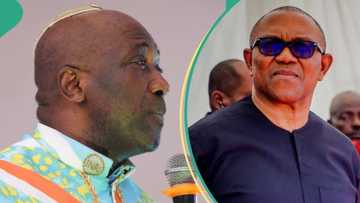
Read also
2027 election: Primate Ayodele releases prophecy on Obidients, dashes Peter Obi's presidential hopes
Adesimbo Oba Jilo III was born in Ondo City and is the eldest of the twenty-two children of Prince Gbadebo Adedoyin Kiladejo. He studied at the University of Ife, which is now known as Obafemi Awolowo University, where he received his Bachelor's degrees in Health Sciences, Medicine, and Surgery.
Roles of traditional rulers in Nigeria
Traditional rulers in Nigeria play significant roles, as listed below.
- Fostering national identity.
- Intervening in conflicts between the government and its people.
- Minor dispute settlement.
- Giving inept state bureaucracies a safety valve within the institution.
- Act as a liaison and interpreter for individuals from other ethnic groups who struggle to communicate with one another.
Titles of traditional rulers in Nigeria
Below are popular traditional titles in Nigeria.
- Lamido, Mai, Sarki, or Shehu in their native tongues, or Emir in English.
- Both the Yoruba and the Edo use the title "Oba."
- In Edo, Odion and Okao were credited to their senior elders and governors, respectively, while Enogie is attributed to the dukes of the traditional rulers.
- The Yoruba tribes are said to have governed Alaafin, Alake, Akarigbo, Awujale, Olomu, Ooni, Orangun, and Olu'wo, among others.
- Isokos and Urhobos in Nigeria's Delta State utilise ovie. Other organisations go by names like Odion-Ologbo, Odio r'Ode, Ohworode, Orodje, and Orosuen.
- Eze, Igwe, and Obi are common titles used by Igbo kings in the South East. Efik and Ibibio leaders are called Adidem (also called Edidem).
- Local names like Amanyanabo, Obanobhan, and Olila-Ebhugh are also used among the people in their immediate neighbouring villages.
Tribal or traditional chief
When referring to the tribes in Nigeria, the terms traditional chiefs or tribal chiefs may also be used instead of traditional rulers.
A traditional chief is a person who serves as the self-government representative for a tribe or ethnic group. Nigeria's states are home to nearly 300 different ethnic groups. According to rank, some of the biggest and most well-known ethnic groups are listed below.
- Hausa
- Yoruba
- Igbo
- Ijaw
- Kanuri
- Fulani
- Ibibio
- Tiv
What are the Nigerian names for kings?
Oba is the main title used by Yoruba people to refer to their monarch. Other names include Ooni, Alake, Alaafin, Awujale, Olomu, Akarigbo, Orangun, Olu'wo, Eleko, Soun, Olumushin, and Eburu.
Who is the most powerful king in Nigeria?
The Oba of Lagos is the supreme ruler of all kings. Rilwan Babatunde Osuolale Aremu Akiolu is the current Oba of Lagos.
Who was the first king in Yoruba land?
The first Yoruba king is Oduduwa. He is credited with creating the world. The Yoruba people are reported to think that their civilisation began at Ile-Ife when the gods descended to earth.
How many kings are there in Nigeria?
There are thousands of traditional rulers across the country. These kings range from powerful emirs and obas to smaller village chiefs.
Who is the most powerful king in Yorubaland?
In Yorubaland, the Ooni of Ife is the most powerful king.
What are the three titles given to traditional rulers in Nigeria?
The three common titles for traditional rulers in Nigeria are Oba, Emir, and Obi.
The kings and their titles in Nigeria listed above still hold sway in their respective communities even though the president currently governs Nigeria. This is because they are both a part of our history and present-day existence. They have developed into our ties to our traditions and our connections.
Legit.ng recently published the Nigerian Army ranks, symbols, and salaries. The Nigerian Army is one of the three services of the Nigerian Armed Forces, alongside the Navy and Air Force.
Becoming an armed forces member is a dignifying goal for anyone who wants to serve their country. Nigeria became independent in 1960 and renamed the Nigerian Military Force (NMF) the Royal Nigerian Army (RNA).
Source: Legit.ng

Cyprine Apindi (Lifestyle writer) Cyprine Apindi is a content creator and educator with over six years of experience. She holds a Diploma in Mass Communication and a Bachelor’s degree in Nutrition and Dietetics from Kenyatta University. Cyprine joined Briefly.co.za in mid-2021, covering multiple topics, including finance, entertainment, sports, and lifestyle. In 2023, she finished the AFP course on Digital Investigation Techniques. She received the 2023 Writer of the Year Award. In 2024, she completed the Google News Initiative course. Email: cyprineapindi@gmail.com

Adrianna Simwa (Lifestyle writer) Adrianna Simwa is a content writer at Legit.ng where she has worked since mid-2022. She has written for many periodicals on a variety of subjects, including news, celebrities, and lifestyle, for more than three years. She has worked for The Hoth, The Standard Group and Triple P Media. Adrianna graduated from Nairobi University with a Bachelor of Fine Arts (BFA) in 2020. In 2023, Simwa finished the AFP course on Digital Investigation Techniques. You can reach her through her email: adriannasimwa@gmail.com

